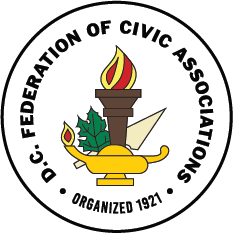Our History
A Brief History
The D.C. Federation of Civic Associations (“DCFCA”) began with an idea proposed at the June 1921 meeting of the Georgetown Civic Association where they wanted all the city’s civic associations to be under one organization. The Association issued a call for a meeting on October 1, 1921, to plan this new organization. The DCFCA was officially formed on November 10, 1921, and its first meeting was held at the Twelfth Street YMCA, with Z.F. Ramsaur presiding. Presidents of the following associations attended this historic meeting: Barry Farms (Elzie S. Hoffman), Benning-Glendale-Oakland (Capt. Howard D. Queen), Central North-East (George C. Smith), Georgetown (George T. Beason), Howard Park (Dr. D. E. Wiseman), Northeast Improvement (Dr. George H. Richardson), Pleasant Plains (E.J. Morton), Potomac (D.C. Nelson), and Reno (Z. T. Thomas). Dr. George H. Richardson was elected President; Elzie S. Hoffman, Vice President; George E. Jackson, Recording Secretary; W. Cohron, Corresponding Secretary; and E. J. Morton, Treasurer. Dr. Richardson served as President until 1932. He was also founder of the McGuire Funeral Home, which to this day sponsors the prestigious George H. Richardson Civil Rights Award at DCFCA’s Annual Awards Luncheon.
The Awards Luncheon was started in 1930 to showcase the hard work of delegates to the Federation and to raise funds for operations and the scholarship program. DCFCA proudly supports high school graduates and provide scholarships for qualifying college candidates. Although the Luncheon is a festive affair, it is also a major fundraising event.
Today the D.C. Federation of Civic Associations, Inc. (aka: Federation) comprises 40 plus separate civic associations throughout the city. Our delegates are active in their respective communities and are the core voices in expressing values of fairness, equality, accountability, choice, and participation of citizens to local and federal government agencies. The Federation educates, enables and empowers its delegates offering continuous learning opportunities on economic development, political participation, nonviolent direct action, social services, ecological and faith-based development through its monthly assembly meetings. The Federation is also involved in helping local civic groups to identify problems, identify assets, locate resources, analyze local power structures, and investigate other concerns in the community in pursuit of a common agenda. The Federation continues to build a base of concerned people, mobilizing these community members to act, and develop leadership from within to work toward achieving common self-interest.
